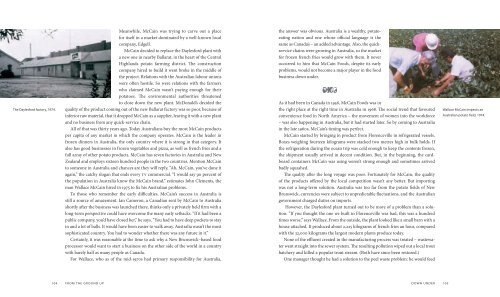From the Ground Up - McCain Foods Limited
From the Ground Up - McCain Foods Limited
From the Ground Up - McCain Foods Limited
You also want an ePaper? Increase the reach of your titles
YUMPU automatically turns print PDFs into web optimized ePapers that Google loves.
The Daylesford factory, 1974.<br />
Meanwhile, <strong>McCain</strong> was trying to carve out a place<br />
for itself in a market dominated by a well-known local<br />
company, Edgell.<br />
<strong>McCain</strong> decided to replace <strong>the</strong> Daylesford plant with<br />
a new one in nearby Ballarat, in <strong>the</strong> heart of <strong>the</strong> Central<br />
Highlands potato farming district. The construction<br />
company hired to build it went broke in <strong>the</strong> middle of<br />
<strong>the</strong> project. Relations with <strong>the</strong> Australian labour unions<br />
were often hostile. So were relations with <strong>the</strong> farmers<br />
who claimed <strong>McCain</strong> wasn’t paying enough for <strong>the</strong>ir<br />
potatoes. The environmental authorities threatened<br />
to close down <strong>the</strong> new plant. McDonald’s decided <strong>the</strong><br />
quality of <strong>the</strong> product coming out of <strong>the</strong> new Ballarat factory was so poor, because of<br />
inferior raw material, that it dropped <strong>McCain</strong> as a supplier, leaving it with a new plant<br />
and no business from any quick-service chain.<br />
All of that was thirty years ago. Today Australians buy <strong>the</strong> most <strong>McCain</strong> products<br />
per capita of any market in which <strong>the</strong> company operates. <strong>McCain</strong> is <strong>the</strong> leader in<br />
frozen dinners in Australia, <strong>the</strong> only country where it is strong in that category. It<br />
also has good businesses in frozen vegetables and pizza, as well as french fries and a<br />
full array of o<strong>the</strong>r potato products. <strong>McCain</strong> has seven factories in Australia and New<br />
Zealand and employs sixteen hundred people in <strong>the</strong> two countries. Mention <strong>McCain</strong><br />
to someone in Australia and chances are <strong>the</strong>y will reply, “Ah, <strong>McCain</strong>, you’ve done it<br />
again,” <strong>the</strong> catchy slogan that ends every TV commercial. “I would say 90 percent of<br />
<strong>the</strong> population in Australia know <strong>the</strong> <strong>McCain</strong> brand,” estimates John Clements, <strong>the</strong><br />
man Wallace <strong>McCain</strong> hired in 1975 to fix his Australian problems.<br />
To those who remember <strong>the</strong> early difficulties, <strong>McCain</strong>’s success in Australia is<br />
still a source of amazement. Ian Cameron, a Canadian sent by <strong>McCain</strong> to Australia<br />
shortly after <strong>the</strong> business was launched <strong>the</strong>re, thinks only a privately held firm with a<br />
long-term perspective could have overcome <strong>the</strong> many early setbacks. “If it had been a<br />
public company, you’d have closed her,” he says. “You had to have deep pockets to stay<br />
in and a lot of balls. It would have been easier to walk away. Australia wasn’t <strong>the</strong> most<br />
sophisticated country. You had to wonder whe<strong>the</strong>r <strong>the</strong>re was any future in it.”<br />
Certainly, it was reasonable at <strong>the</strong> time to ask why a New Brunswick–based food<br />
processor would want to start a business on <strong>the</strong> o<strong>the</strong>r side of <strong>the</strong> world in a country<br />
with barely half as many people as Canada.<br />
For Wallace, who as of <strong>the</strong> mid-1970s had primary responsibility for Australia,<br />
<strong>the</strong> answer was obvious. Australia is a wealthy, potato-<br />
eating nation and one whose official language is <strong>the</strong><br />
same as Canada’s – an added advantage. Also, <strong>the</strong> quickservice<br />
chains were growing in Australia, so <strong>the</strong> market<br />
for frozen french fries would grow with <strong>the</strong>m. It never<br />
occurred to him that <strong>McCain</strong> <strong>Foods</strong>, despite its early<br />
problems, would not become a major player in <strong>the</strong> food<br />
business down under.<br />
As it had been in Canada in 1956, <strong>McCain</strong> <strong>Foods</strong> was in<br />
<strong>the</strong> right place at <strong>the</strong> right time in Australia in 1968. The social trend that favoured<br />
convenience food in North America – <strong>the</strong> movement of women into <strong>the</strong> workforce<br />
– was also happening in Australia, but it had started later. So by coming to Australia<br />
in <strong>the</strong> late 1960s, <strong>McCain</strong>’s timing was perfect.<br />
<strong>McCain</strong> started by bringing in product from Florenceville in refrigerated vessels.<br />
Boxes weighing fourteen kilograms were stacked two metres high in bulk holds. If<br />
<strong>the</strong> refrigeration during <strong>the</strong> ocean trip was cold enough to keep <strong>the</strong> contents frozen,<br />
<strong>the</strong> shipment usually arrived in decent condition. But, in <strong>the</strong> beginning, <strong>the</strong> cardboard<br />
containers <strong>McCain</strong> was using weren’t strong enough and sometimes arrived<br />
badly squashed.<br />
The quality after <strong>the</strong> long voyage was poor. Fortunately for <strong>McCain</strong>, <strong>the</strong> quality<br />
of <strong>the</strong> products offered by <strong>the</strong> local competition wasn’t any better. But importing<br />
was not a long-term solution. Australia was too far from <strong>the</strong> potato fields of New<br />
Brunswick, currencies were subject to unpredictable fluctuations, and <strong>the</strong> Australian<br />
government charged duties on imports.<br />
However, <strong>the</strong> Daylesford plant turned out to be more of a problem than a solution.<br />
“If you thought <strong>the</strong> one we built in Florenceville was bad, this was a hundred<br />
times worse,” says Wallace. <strong>From</strong> <strong>the</strong> outside, <strong>the</strong> plant looked like a small barn with a<br />
house attached. It produced about 2,225 kilograms of french fries an hour, compared<br />
with <strong>the</strong> 32,000 kilograms <strong>the</strong> largest modern plants produce today.<br />
None of <strong>the</strong> effluent created in <strong>the</strong> manufacturing process was treated – wastewater<br />
went straight into <strong>the</strong> sewer system. The resulting pollution wiped out a local trout<br />
hatchery and killed a popular trout stream. (Both have since been restored.)<br />
One manager thought he had a solution to <strong>the</strong> peel waste problem: he would feed<br />
104 <strong>From</strong> <strong>the</strong> <strong>Ground</strong> up<br />
down under 105<br />
Wallace <strong>McCain</strong> inspects an<br />
Australian potato field, 1974.






